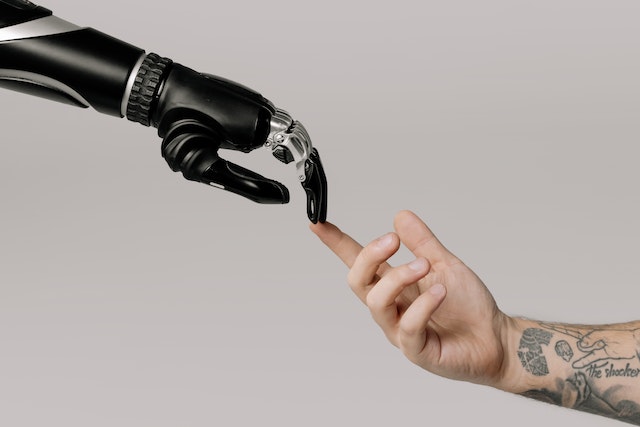The idea of a cyborg, a human being integrated with technology, has long been a staple of science fiction. From RoboCop to the Borg, we have been fascinated by the idea of enhancing human abilities with the power of technology. But in recent years, the concept of the cyborg has moved from the realm of science fiction to reality, as researchers have begun to develop technologies that can connect the brain to a computer.
This technology, known as a brain-computer interface (BCI), has the potential to revolutionize business and society by enabling people to perform complex tasks more efficiently and effectively than ever before. In this article, we will explore the science behind BCIs, their potential applications in business and society, and the ethical and social implications of this technology.
The Science of Brain-Computer Interfaces
Before we can understand the potential of BCIs, it is important to understand how they work. A BCI is a device that connects the brain to a computer, allowing the user to control the computer or receive information directly through their brain.
BCIs work by detecting the electrical signals produced by neurons in the brain. These signals, known as action potentials, can be picked up by electrodes placed on the surface of the scalp or implanted directly into the brain. The signals are then amplified and processed by a computer, which can use them to control a device or provide feedback to the user.
There are several different types of BCIs, each with its own strengths and weaknesses. The most common types are invasive and non-invasive BCIs. Invasive BCIs involve implanting electrodes directly into the brain, while non-invasive BCIs use electrodes placed on the scalp. Invasive BCIs tend to be more accurate and precise, but they also carry greater risks and require surgery to implant. Non-invasive BCIs are less accurate but can be used more easily and safely.
BCIs can be used for a variety of applications, from controlling prosthetic limbs to enhancing cognitive abilities. One of the most promising applications of BCIs is in the field of medical research and treatment. BCIs can be used to study the brain and understand how it processes information, which could lead to new treatments for conditions such as Parkinson’s disease and epilepsy.
In addition to medical applications, BCIs have the potential to revolutionize business and society by enabling people to perform complex tasks more efficiently and effectively than ever before.
Applications of Brain-Computer Interfaces in Business
The potential applications of BCIs in business are vast and varied. Here are just a few examples of how BCIs could be used to enhance business operations:
Augmenting human memory and cognition
BCIs could be used to enhance human memory and cognition, allowing workers to recall information more quickly and accurately. This could be particularly useful in fields such as finance and law, where workers must remember large amounts of complex information.
Enhancing worker productivity
BCIs could be used to enhance worker productivity by enabling workers to perform complex tasks more quickly and accurately. For example, a worker in a manufacturing plant could use a BCI to control a robot arm more efficiently, reducing the time and effort required to complete a task.
Improving safety in the workplace
BCIs could be used to improve safety in the workplace by detecting signs of fatigue or distraction in workers. For example, a worker wearing a BCI could be alerted if they begin to show signs of drowsiness, reducing the risk of accidents or injuries.
Enabling remote work
BCIs could be used to enable remote work, allowing workers to control devices or perform tasks from a distance. This could be particularly useful in fields such as engineering and maintenance, where workers may need to access and control equipment in remote or hazardous locations.
Providing personalized customer experiences
BCIs could be used to provide personalized customer experiences by enabling companies to gather real-time information about customers’ preferences and needs. For example, a retailer could use a BCI to monitor customers’ reactions to products and adjust their marketing strategy accordingly.
These are just a few examples of how BCIs could be used to enhance business operations. The potential applications of this technology are vast and varied, and it is likely that we will see many more innovative uses of BCIs in the years to come.
Applications of Brain-Computer Interfaces in Society
In addition to their potential applications in business, BCIs have the potential to revolutionize society by enabling people to perform tasks and interact with the world in new and innovative ways. Here are just a few examples of how BCIs could be used in society:
Restoring mobility to people with disabilities
BCIs could be used to restore mobility to people with disabilities by enabling them to control prosthetic limbs or other assistive devices using their brain signals. This could significantly improve their quality of life and independence.
Restoring sensory perception to people with disabilities
BCIs could be used to restore sensory perception to people with disabilities by enabling them to receive sensory information directly through their brain. For example, a BCI could be used to restore vision to people with certain types of blindness or to enable deaf people to hear.
Improving mental health
BCIs could be used to improve mental health by enabling people to monitor and regulate their brain activity. For example, a BCI could be used to help people with anxiety disorders learn to regulate their stress responses.
Enhancing education
BCIs could be used to enhance education by enabling students to learn more efficiently and effectively. For example, a BCI could be used to monitor students’ attention levels and adjust the pace and content of instruction accordingly.
Enabling new forms of communication
BCIs could be used to enable new forms of communication, allowing people to communicate with each other using their brain signals. For example, a BCI could be used to enable people with severe communication disorders to communicate more effectively.
These are just a few examples of how BCIs could be used to revolutionize society. The potential applications of this technology are vast and varied, and it is likely that we will see many more innovative uses of BCIs in the years to come.
Ethical and Social Implications of Brain-Computer Interfaces
While the potential benefits of BCIs are vast and varied, there are also ethical and social implications to consider. One of the main concerns is the potential for BCIs to exacerbate existing social and economic inequalities. If BCIs become widespread, there is a risk that those who cannot afford them or who are unable to access them will be left behind.
Another concern is the potential for BCIs to be used for nefarious purposes, such as mind control or surveillance. If BCIs become widespread, there is a risk that they could be used to control or manipulate people’s thoughts and actions.
There is also a risk that BCIs could be used to perpetuate existing biases and inequalities. For example, if BCIs are used to enhance worker productivity, there is a risk that they could be used to exploit workers and extract more labor from them.
To address these concerns, it is important to develop policies and regulations that ensure that BCIs are used in a fair and ethical manner. It is also important to ensure that BCIs are accessible to everyone, regardless of their social or economic status.
Author Bio:
William Rosellini is a former minor league baseball player and entrepreneur. Rosellini was the founding CEO of Microtransponder and co-inventoran FDA approved implantable neural interface to enhance cortical plasticity after a stroke. He was also the CEO of Perimeter Medical Imaging AI which received FDA approval for a medical imaging device that uses machine learning to support surgeons during breast cancer. He was also a science advisor for the Deus Ex video game series, using his expertise to add a touch of realism to the game’s futuristic world. His educational background includes a JD, MBA, MS of Accounting, MS of Computational Biology, MS of Neuroscience, and MS of Regulatory Science.




